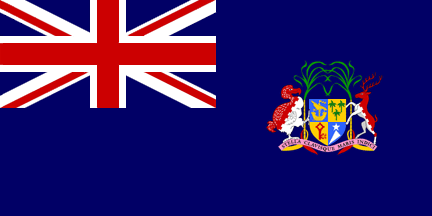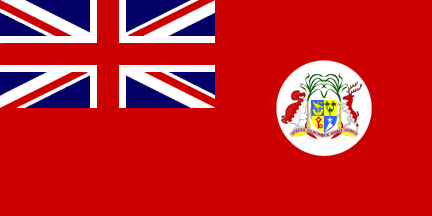
FOTW beschäftigt sich mit der Wissenschaft der Vexillologie (Flaggenkunde).
Alle auf dieser Website dargebotenen Abbildungen dienen ausschließlich der Informationsvermittlung im Sinne der Flaggenkunde.
Wir distanziert uns ausdrücklich von allen hierauf dargestellten Symbolen verfassungsfeindlicher Organisationen.
Last modified: 2015-07-28 by ian macdonald
Keywords: key (red) | star | dodo | stella clavisque maris indici | sambur deer | deer (red and white) | deer: sambur |
Links: FOTW homepage |
search |
disclaimer and copyright |
write us |
mirrors
Mauritius became a republic on 12th March 1992, the
twenty-fourth anniversary of independence.
Ken Westmoreland, 16 July 2004
On 12 March 1992 Mauritius became republic, but the
independence flag didn’t change.
Jan Zrzavy, 09 Oct 2002
Since 1810 until 1968 Mauritius was a British colony with
Governors. Before that 1718-1810 Mauritius was
known as Île de France, and was French colony, with Governors
(since 1734 Governors-General) of the Compagnie des Indes.
Željko Heimer, 16 Jun 2002
Mauritius was called Île de France from
1711 to 1810 by the French. The island was initially
colonized and owned by the Compagnie des Indes, and
later ceded to the king of France. Port-Louis
might have been named after either Louis XV (1715-1774) or Louis XVI
(1774-1791). Louis XV is most probable, since the Compagnie des Indes
lost a lot of money on the Île de France and might have tried
to get rid of it as soon as possible.
Ivan Sache, 20 Dec 2003
Even before, 1638-1710 Mauritius was under Dutch administration;
in 1710-1718 there was no colonial power governing Mauritius…
Željko Heimer, 16 Jun 2002
Mautitius is named after the Dutch prince Maurice (Dutch: Maurits)
of Orange, son of William of Orange. I think only the
normal Dutch flags were used, and maybe also
the flags of the Netherlands East India Company
VOC. The island was discovered in 1505 by the
Portuguese.
Ivan Sache, 20 Dec 2003

In 1923 the disk was definitly abandoned
and the coat of arms now apeared directly on blue background.
Željko Heimer, 16 Jun 2002
I’m not certain whether if Mauritian blue ensigns were ever defaced
without a disk. I have never seen an actual sample. I do know that the disk
was used right up ’till 1968 and have seen samples and photos.
Clay Moss, 04 Jul 2005
Officially the badge should not have been on a white
disc after 14 December 1923. BR20 of 1955
[hms55] showed it without a disc.
David Prothero, 05 Jul 2005
Though the edict may have been passed down by the Admiralty or whoever,
I do know that Mauritius continued to use ensigns with
disks right up ’till the time it achieved
independence.
Clay Moss, 08 Jun 2005
This flag was superseded at the time of
independence in 1968.
Vincent Morley, 25 Feb 1997

See also: Governor of 1906-1968
The arms were granted in 1906 instead of the
“armslike” badge used before.
Due to the general misunderstanding of the use of the
white disk behind the badges in ensigns (thoughout the
Empire, not oly in Mauritius) it was not clear
weather the badge should be there or not, until 1923 when the official
document explicitly stated that the disk is not needed in this particular
case.
Željko Heimer, 16 Jun 2002
This form of the Mauritius Blue Ensign was approved
14-12-1869 (CO 325/54), but 7-7-1921 it was agreed that
the white disc was not necessary and was officially
removed 14-12-1923 (ADM 116/1847B). Both Public Records
Office documents.
David Prothero, 30 Nov 1998
I do know that the disk was used right up ’till 1968 and
have seen samples and photos.
Clay Moss, 04 Jul 2005
1906.gif)
The arms were adopted 1906 and before
were another pattern.
Jaume Ollé, 05 Dec 1998
When placed on a white disk, the coat of arms must be off centered a
bit toward the hoist. When actually centered, the whole coat of arms is off
center, with the shield ending up substantially toward the fly. The dodo
bird’s size it problematic.
Clay Moss, 08 Jun 2005
In Flaggenbuch [neu39] the badge
of Mauritius there (page 74) is one of the rare examples of not the highest
quality of images — the colours are mostly mischosen and the larger part of
the inscription in the ribbon is missing (having only the word "Indici"). I
guess that this must be a printing error. (Possibly only in
[neu92] the 1992 reprint?)
Željko Heimer, 17 Jun 2002
It has been corrected on a separate loose page, that is: the
inscription; you should have received that too.
Jarig Bakker, 17 Jun 2002

See also: Governor of 1869-1906
This badge is shown in the 1881 H.M.Stationery Office publication
Arms and Badges of the Several Colonies of Great Britain
[hms81].
David Prothero, 16 Jun 2002
The badge approved 14 Dec 1869, consisted of a quartered shield, similar to the one that appears on the Arms granted 25-aug-1906; beneath it was a scroll bearing the motto, «stella clavisque maris indici» (Latin for «star and key of the Indian Sea»). No sugar cane, embattled dodo, or antelope.
The shape of the shield was different. It had an ornate “frame”, similar to, but not the same as, the style of the shield of St Helena (1875-1984). There were also differences in the details of the quarters: the first quarter was a three-masted sailing ship, not a lymphad: the key in the third quarter was gold, on a black background: the fourth quarter was divided horizontally to represent the sky above the sea, with the light from the star, which had six points, shining down and reflecting in the sea.
A note alongside the drawing in the Colonial Office Flag Book reads:
This is called the arms of the colony, but in Governor’s Despatch No 139 of 21-6-1875 it was explained that the drawing is a badge for the governor’s flag, approved by the Secretary of State in Despatch 14-12-1869, and that it differs from the device on the seal sent out in Despatch No 29 of 10-12-1839.Theoretically this badge should have been applied direct to the Blue Ensign with no white disc. However the fact that the 1906 Arms were initially borne on a white disc which was not removed until 1923, suggests to me that the 1869 badge was similarly displayed on a white disc.
David Prothero, 08 Dec 1998

Mauritius did not have a defaced Red Ensign; the official merchant ensign
was the plain Red Ensign. That is not to say
that there may not have been unofficial Mauritius Red
Ensigns.
David Prothero, 22 May 1999

Unwarranted red ensigns [with the arms] were
somewhat common.
Clay Moss, 04 Jul 2005
Anything below this line was not added by the editor of this page.
Hosted by: Fanshop-Online.de und Handy-Shop.de
Tipp: Apple iPhone 12 im Shop